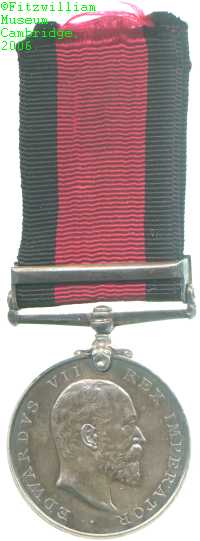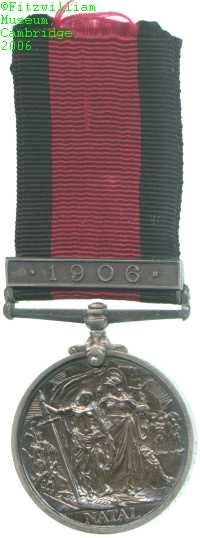
Obverse, a bust of King Edward VII facing right

Reverse, Britannia with an orb and the figurine of Peace treating with Natalia who holds a sword, with a kraal and natives in background

Obverse, a bust of King Edward VII facing right |

Reverse, Britannia with an orb and the figurine of Peace treating with Natalia who holds a sword, with a kraal and natives in background |
The British Colony of Natal was founded in 1843 on territory acquired from the Boer Republic of Natalia in the First Boer War, but expanded substantially by the annexation to it of Zululand after the Anglo-Zulu War of 1893. This situation left considerable resentment of British rule, worsened by a time of cattle disease and poor harvests and manifested especially in a consequent refusal to pay hut-taxes. When in 1906 attempt to enforce such payments resulted in the killings of two Natal policemen, the local government raised forces for a punitive `drive' which imprisoned three chiefs.
From this perhaps heavy-handed treatment resulted a far larger insurrection, and troops were raised by various emergency means both locally and abroad. Among these rapidly-formed units was a group of volunteers from the local Lancaster and York Association, and the Natal Indian Congress raised a unit of stretcher-bearers that included one Sergeant-Major Mahatma Gandhi.
The assembled forces proved more than capable of meeting the threat and a `drive' through the Natal forests achieved the retreat and finally surrender of the rebel chiefs. This medal was awarded to Private W. Patter, of the Lancashire and Yorkshire Contingent formed by the Association mentioned above. It bears, as do almost all these medals, a bar that was awarded to those doing more than fifty days' service on the campaign. Lester Watson purchased the medal at some point before 1928.